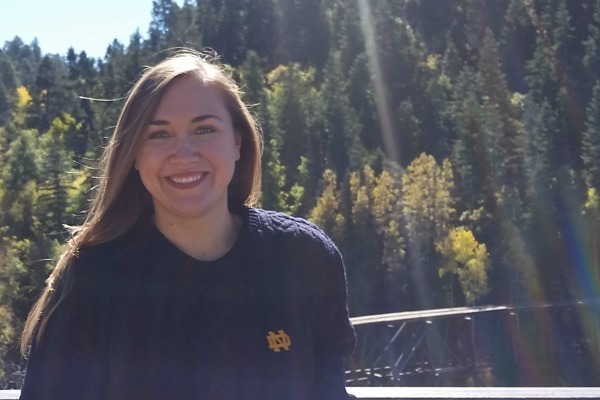

“Life’s too short. There’s always something to be sad about, so you just have to be happy.” Her approach to positivity also seems to be Rebekah Wierson’s (’13) approach to life. Bursting with energy and ready to share her witty take on life, Rebekah is a strong advocate for Notre Dame’s sustainability minor and also for a broadened perspective of sustainability.
When she graduated from the School of Architecture five years ago Rebekah was the first architecture student to complete the sustainability minor. Growing up in El Paso, TX she used to help her dad gather up their recycling. “My dad was probably the first in the city to start recycling – no joke,” Rebekah explains that sustainability was ever-present in her childhood. Yet she always thought there was something bigger to it, that she couldn’t quite put her finger on, and the classes she took for the sustainability minor finally enabled her to start expressing this.
Business, history and other classes that aren’t located in Bond Hall – this is where the minor in sustainability led Rebekah and she so enjoyed learning what sustainability means in other departments. Yet she also knew that it could be integrally connected to architecture, going beyond the typical assessments of sun exposure and energy efficiency. Both her sustainability capstone project and her architecture thesis explored this connection. She thought, “this is putting my words to the test, bridging everything I learned about sustainability into architecture.” For her architecture thesis Rebekah designed a building that would house a sustainable elderly care program and for her sustainability capstone she designed the program that would be located in that building. “It was hard, but it was a lot of fun,” Rebekah describes the challenges but also the triumphs that came from being the only architecture student in the minor. She got used to hearing, “oh my gosh it’s a drawing!”
Back in El Paso after graduation, Rebekah worked for the PhiloWilke Partnership, specializing in healthcare. It turns out that her thesis led Rebekah right into her first job, working for an architecture firm that has many big name healthcare clients. Three years down the road, when Rebekah was told she had to move to Houston or get another job, this experience with healthcare also helped her find her current position, as the engineering project manager at University Medical Center. This county hospital is the only trauma one medical center in a 45-mile radius and also operates on a treatment first, payment second policy. This practice is important to Rebekah.
Rebekah’s position with this hospital has been eye-opening in several ways. “I would have never told you when I graduate I’d be working in a hospital doing as much talking as I do. But it’s been great,” she says. While she often gets asked if she misses architecture, Rebekah explains why she doesn’t. Very occasionally she misses the design, but most of this yearning is satisfied by the schematic design and 3D modeling that she gets to do for the hospital. And she certainly doesn’t miss the glory of putting her name on a building. “That glory didn’t make me feel how this job makes me feel.”
“It’s a little bit more than managing construction projects.” What Rebekah really meant was that she wears many hats, from choosing the best vendors for hospital furniture and redesigning floor plans to accommodate hospital transitions to explaining why someone’s requested item can’t be purchased and helping them devise a plan to continue without it. Rebekah describes this work as a “chaotic but wonderful position.” Since she started a year ago, Rebekah has learned to delight in managing the chaos, feeling like the master of a little world. She acknowledges the challenges of not having control over the budget and having to adhere to the many policies that encumber an open-record public hospital. Yet she also emphasizes the importance of having a great employer and team and also thinking about the reasons for the rules. The focus on really helping the patients provides the underlying ethic for hospital policy. “You have to remember your mission and then it seems reasonable.” Rebekah focuses on the importance of “thinking beyond yourself and looking at the bigger picture.”
Managing a team of about 30 people in the hospital’s engineering department has also enlightened Rebekah in many ways. Her favorite part of the job has been realizing what goes into a single day of operation for the hospital. She’s always been interested in the behind the scenes and here she realizes that if a single person isn’t in the right place, things don’t go well. There’s a measure of humility in acknowledging the importance of the community. “Every single person has value,” Rebekah says.
Looking beyond oneself seems to be a central mantra of Rebekah’s. It’s critical in her appreciation for her work at the hospital and she also finds it to be an essential part of studying and practicing sustainability. It’s an opportunity to look beyond the required courses and realize new connections across different departments. While Rebekah used to worry about the stigma of being a tree hugger, she found that her sustainability capstone and architecture thesis armed her with a way to explain that she was actually an educated woman who understood sustainability’s many applications. It allowed her to open doors for others and invite them into a more connected and sustainable worldview. She says, “You can have an impact after studying sustainability because there’s so many ways to do so.”